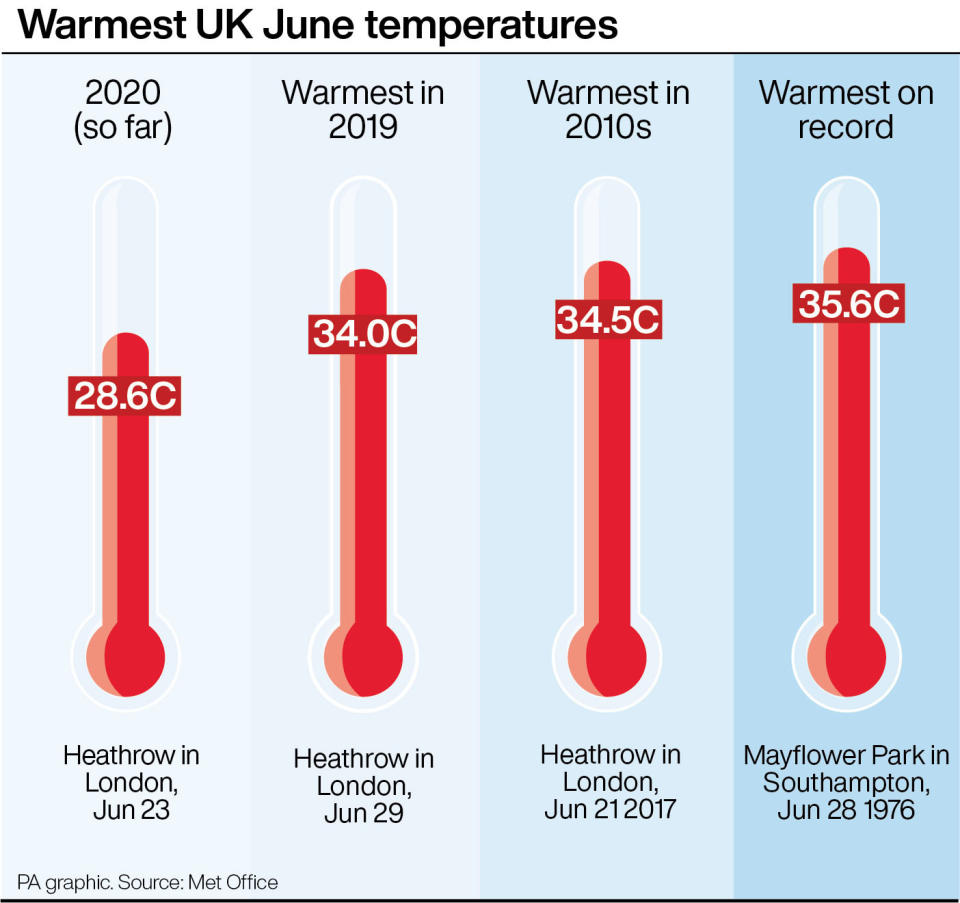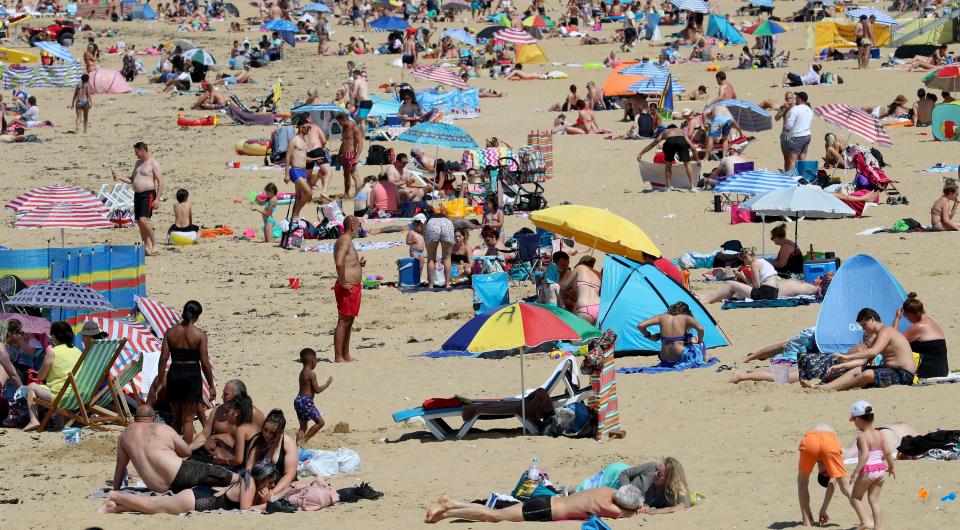Heatwave health warning as temperatures soar to over 30C

Experts have warned about the health risks of heatwaves as temperatures soar across the UK.
The south of England will bask in over 30C (86F) this week, making Blighty warmer than Ibiza and the Bahamas.
Read more: What a heatwave does to the body
Warnings have also been issued about UV levels, which are expected to be “exceptionally high” over the coming days.
While many people will undoubtedly welcome the sunshine after months of lockdown, overexposure can lead to burns, dehydration and even heat stroke.

‘The sun is as strong as it gets at the moment’
Met Office meteorologist Alex Burkill has warned UV levels will be “reaching 8 across many places and will be reaching 9 across parts of Devon and Cornwall tomorrow.
“That’s about as high as it gets really in the UK.
“The sun is as strong as it gets at the moment because we’re so close to the solstice.
“We’ve got peak sun strength, clear skies, plenty of sunshine – it’s the perfect ingredients for high UV.”
Read more: This mini air conditioner is causing quite a stir on TikTok
The UV index measures the strength of the sun’s rays. The Met Office claims the index “does not exceed 8 in the UK”, with that level also being “rare”.
Overexposure can lead to burning and even skin cancer in the long term.
Burkill stressed anyone who will be outside for prolonged periods should be particularly cautious when it comes to sunscreen, staying hydrated and seeking shade.
With non-essential shops now open after months of lockdown, customers should be aware the dangers may extend well beyond the coronavirus.
Enforced social distancing means stores are limiting the number of people inside at any one time, forcing many to queue outdoors.
“You could end up in the sun for longer than expected on what would normally be a quick journey, such as queuing to enter the supermarket, so you should be prepared to look after yourself and others,” said Dr Lynn Thomas, medical director of St John Ambulance.
“Heat exhaustion and heatstroke are two of the most serious problems that can develop when the mercury soars, but by being prepared you can spot the early warning signs, such as headache and dizziness.”
These can come about when the body overheats.
Heat exhaustion triggers heavy sweating and a rapid pulse. Left untreated, heat exhaustion can lead to heat stroke, a potentially life-threatening disorder that occurs when the body reaches 40C (104F) or above.
In severe cases, it can seriously damage the vital organs.
Read more: Need to cool down? Add this best-selling Amazon fan to your basket
London Fire Brigade has also urged people not to have barbecues on dry grass, drop cigarettes or matches, or leave rubbish like glass bottles lying around, with these all being fire risks.
“Barbecuing on dry grass is thoughtless and reckless and can easily be the cause of a significant fire, which isn’t something you want on your conscience,” said deputy commissioner Richard Mills.
The public are also being reminded to take care around water this summer.
Emergency services rushed to the River Thames in Cookham, Berkshire, on 23 June amid reports a man was missing after going for a dip.
Photographs also show packed beaches as people take advantage of the good weather after months cooped up indoors.

How to stay safe in the sun
If you start to feel out of sorts, stop all activity and rest. Move to a cool place and sip cold water or a rehydration sports drink.
Lie down with your feet raised. If possible, cool the skin with a sponge or fan. Cold packs around the neck and armpits may also help.
Most people start to feel better with 30 minutes. If things do not improve after an hour, seek medical help immediately.
People should also call 999 if they are not sweating despite being hot, have a temperature of 40C (104F) or above, are confused, breathe quickly or appear short of breath, have a seizure, lose consciousness or become unresponsive.
The good news is the sun can be enjoyed safely, with dehydration and overheating both preventable.
While it may sound obvious, drink plenty of fluids. This will help your body produce sweat that cools you down.
Wear a broad-spectrum sunscreen, sunglasses and a wide-brimmed hat when out and about. Loose-fitting clothing will further protect you from the sun without causing overheating.
Take it easy on a hot day, rest frequently in the shade if exercising, and allow yourself to adjust to the warm weather.
Try to also avoid being outdoors at the hottest time, typically between 11am and 3pm.
Remember to also never leave a child in a parked car on a warm day, even if the windows are open or it is in the shade.
Alcohol should also not be drunk excessively in the sun.


